“Unless we understand what is happening, we are unable to help.
Blind assistance is ineffective.”
STORIES
December 16, 2016
Romke Hoogwaerts I've been following your photojournalism at the Battle for Mosul. You share a great deal of heart-stopping images to Instagram, both as regular posts and as Stories. They're powerful. There's so many questions I want to ask you. Let's start with what's happening there, because I get the sense that the significance of this battle isn't as widely known as it should be here in the West. Is it even possible to briefly summarize why this battle is so important?
Cengiz Yar I appreciate that. It's encouraging to know people back home are following along with what's going on here. Simplistically put — the future of Iraq is tied to Mosul, the future of the Middle East to Iraq, and the future of global terrorism to ISIS. The fight for and control of this city has impacts at a global level. It's the second largest city in Iraq and officials estimate that over a million people remain inside. ISIS has controlled Mosul for the past two and a half years. How this battle plays out and what happens after it will have long lasting repercussions.
Romke Hoogwaerts I've been following your photojournalism at the Battle for Mosul. You share a great deal of heart-stopping images to Instagram, both as regular posts and as Stories. They're powerful. There's so many questions I want to ask you. Let's start with what's happening there, because I get the sense that the significance of this battle isn't as widely known as it should be here in the West. Is it even possible to briefly summarize why this battle is so important?
Cengiz Yar I appreciate that. It's encouraging to know people back home are following along with what's going on here. Simplistically put — the future of Iraq is tied to Mosul, the future of the Middle East to Iraq, and the future of global terrorism to ISIS. The fight for and control of this city has impacts at a global level. It's the second largest city in Iraq and officials estimate that over a million people remain inside. ISIS has controlled Mosul for the past two and a half years. How this battle plays out and what happens after it will have long lasting repercussions.
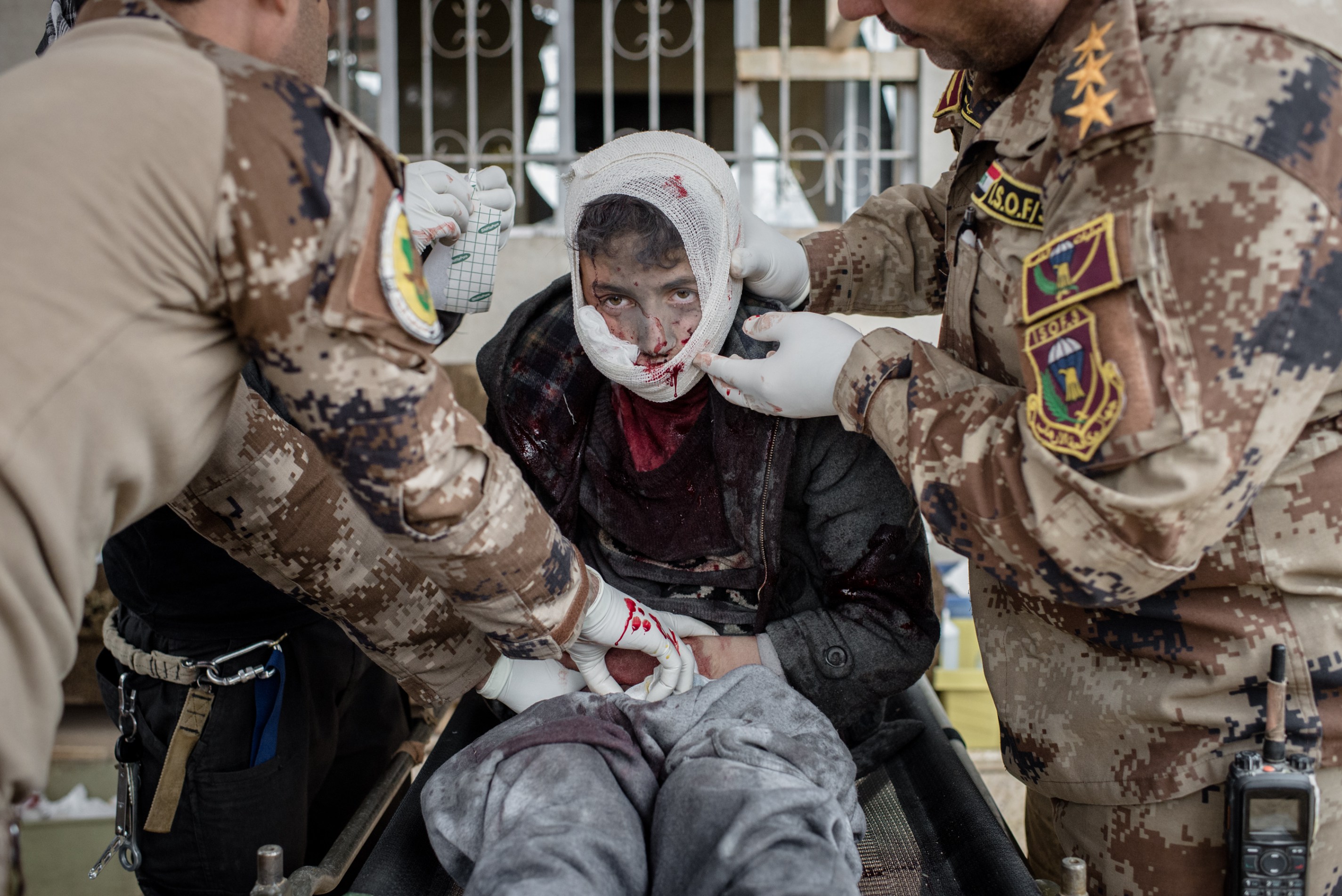
Cengiz Yar, A young boy is treated for shrapnel wounds to his face and groin at a clinic in al-Samah, Mosul, on Thursday, December 1, 2016. Medics attempted to stop the bleeding but the boy continued to drip blood through his bandages as he was loaded into a waiting ambulance.
Romke What brought you to Mosul? Are you shooting independently?
Cengiz I've been based in the Kurdistan region northern Iraq for the past year. I came here initially in 2014 doing a long project on Syrian refugees and was drawn back for a number of reasons - one of which being the fight against ISIS and the inevitable battle to retake Mosul. Yes, I'm shooting independently for a variety of clients in the news world and humanitarian sector. Once in awhile I'll write or shoot video.
Romke You were selected to be on Getty's Emerging Talent roster. What does that mean for your work on the ground? Are they helping you distribute your work?
Cengiz It's an incredible honor to be selected for Getty's list and especially alongside such a strong group of photographers. It hasn't changed what I'm doing on the ground. They aren't distributing my work but they do help promote my projects.
Romke The way you publish Stories on Instagram is informative, thoughtful, smart. It's inspiring to see you work with it in such an educational way. What prompted you to use Instagram that way?
Cengiz The ways people are consuming content is changing. We saw it over the years through Twitter, Facebook, and Instagram but it shifted even further with Snapchat. When I was home in Chicago last summer, I had a friend tell me that he couldn't look at the Syrian refugee crisis the same way after watching my Snapchats. Which I found hilarious at the time, like, how was that the medium I got through to you with. But if vertical social video is the way I can reach people then I should, at the very least, be trying to use it. Visual journalists have a wealth of ways to tell stories instantly with a growing mobile audience and it's exciting to see how it evolves.
Cengiz I've been based in the Kurdistan region northern Iraq for the past year. I came here initially in 2014 doing a long project on Syrian refugees and was drawn back for a number of reasons - one of which being the fight against ISIS and the inevitable battle to retake Mosul. Yes, I'm shooting independently for a variety of clients in the news world and humanitarian sector. Once in awhile I'll write or shoot video.
Romke You were selected to be on Getty's Emerging Talent roster. What does that mean for your work on the ground? Are they helping you distribute your work?
Cengiz It's an incredible honor to be selected for Getty's list and especially alongside such a strong group of photographers. It hasn't changed what I'm doing on the ground. They aren't distributing my work but they do help promote my projects.
Romke The way you publish Stories on Instagram is informative, thoughtful, smart. It's inspiring to see you work with it in such an educational way. What prompted you to use Instagram that way?
Cengiz The ways people are consuming content is changing. We saw it over the years through Twitter, Facebook, and Instagram but it shifted even further with Snapchat. When I was home in Chicago last summer, I had a friend tell me that he couldn't look at the Syrian refugee crisis the same way after watching my Snapchats. Which I found hilarious at the time, like, how was that the medium I got through to you with. But if vertical social video is the way I can reach people then I should, at the very least, be trying to use it. Visual journalists have a wealth of ways to tell stories instantly with a growing mobile audience and it's exciting to see how it evolves.
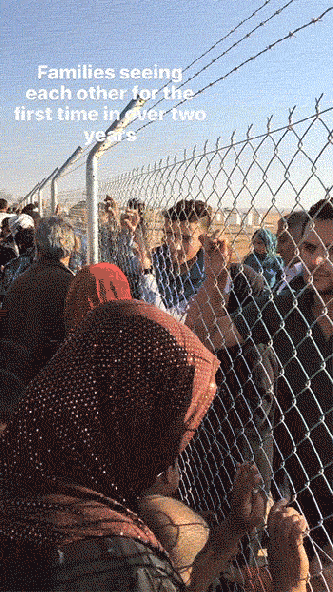
Cengiz Yar, Nov 4, 2016.
Cengiz Yar,
Dec 29, 2016
Romke Who else do you see using Instagram stories like that?
Cengiz I don't see many people using Stories at this point in a journalistic way, but I think that will begin to change as people find new ways to use it and see its possibilities.
Romke That's true for me too, most people I know use Stories for personal snippets and save their regular posts for the good stuff. I tried to use stories to show a bonfire project I was shooting in the Hague to get people familiar with the scene before they saw my photos, and I like that they disappear so that I don't have to worry about giving away too much information. I like how Stacy Kranitz uses her Stories, she's a documentary photographer that incorporates personal elements in her work so it's a perfect dissemination medium for her. But yeah, I'd love to see more photojournalists use it too.
The black and white photos you post on Stories, they're not also taken with your phone, are they? Are those photos you also license?
Cengiz Almost everything I've been sharing through stories is shot on my iPhone and then uploaded in a sequence at the end of the day. So yes, those black and white images are from my phone's camera. They could be [available] for licensing but for now I'm just using them for daily storytelling.
Romke Is there a photographer or photobook you've been spending time with lately? What kind of influences do you like to mix into your work?
Cengiz I'm most influenced by my peers and colleagues. Shooting alongside people like Hossein Fatemi, Alice Martins, Ivor Prickett - how we see things and stories differently. Lots of learning happens through working on stories alongside other people.
I've always mixed a lot of music into my workflow. Mainly grindcore and death metal. This year it's been a lot of Nails, Within Destruction, Aborted, Gatecreeper, Angelmaker, and Ingested. Not so much on the photobook front.
Cengiz I don't see many people using Stories at this point in a journalistic way, but I think that will begin to change as people find new ways to use it and see its possibilities.
Romke That's true for me too, most people I know use Stories for personal snippets and save their regular posts for the good stuff. I tried to use stories to show a bonfire project I was shooting in the Hague to get people familiar with the scene before they saw my photos, and I like that they disappear so that I don't have to worry about giving away too much information. I like how Stacy Kranitz uses her Stories, she's a documentary photographer that incorporates personal elements in her work so it's a perfect dissemination medium for her. But yeah, I'd love to see more photojournalists use it too.
The black and white photos you post on Stories, they're not also taken with your phone, are they? Are those photos you also license?
Cengiz Almost everything I've been sharing through stories is shot on my iPhone and then uploaded in a sequence at the end of the day. So yes, those black and white images are from my phone's camera. They could be [available] for licensing but for now I'm just using them for daily storytelling.
Romke Is there a photographer or photobook you've been spending time with lately? What kind of influences do you like to mix into your work?
Cengiz I'm most influenced by my peers and colleagues. Shooting alongside people like Hossein Fatemi, Alice Martins, Ivor Prickett - how we see things and stories differently. Lots of learning happens through working on stories alongside other people.
I've always mixed a lot of music into my workflow. Mainly grindcore and death metal. This year it's been a lot of Nails, Within Destruction, Aborted, Gatecreeper, Angelmaker, and Ingested. Not so much on the photobook front.
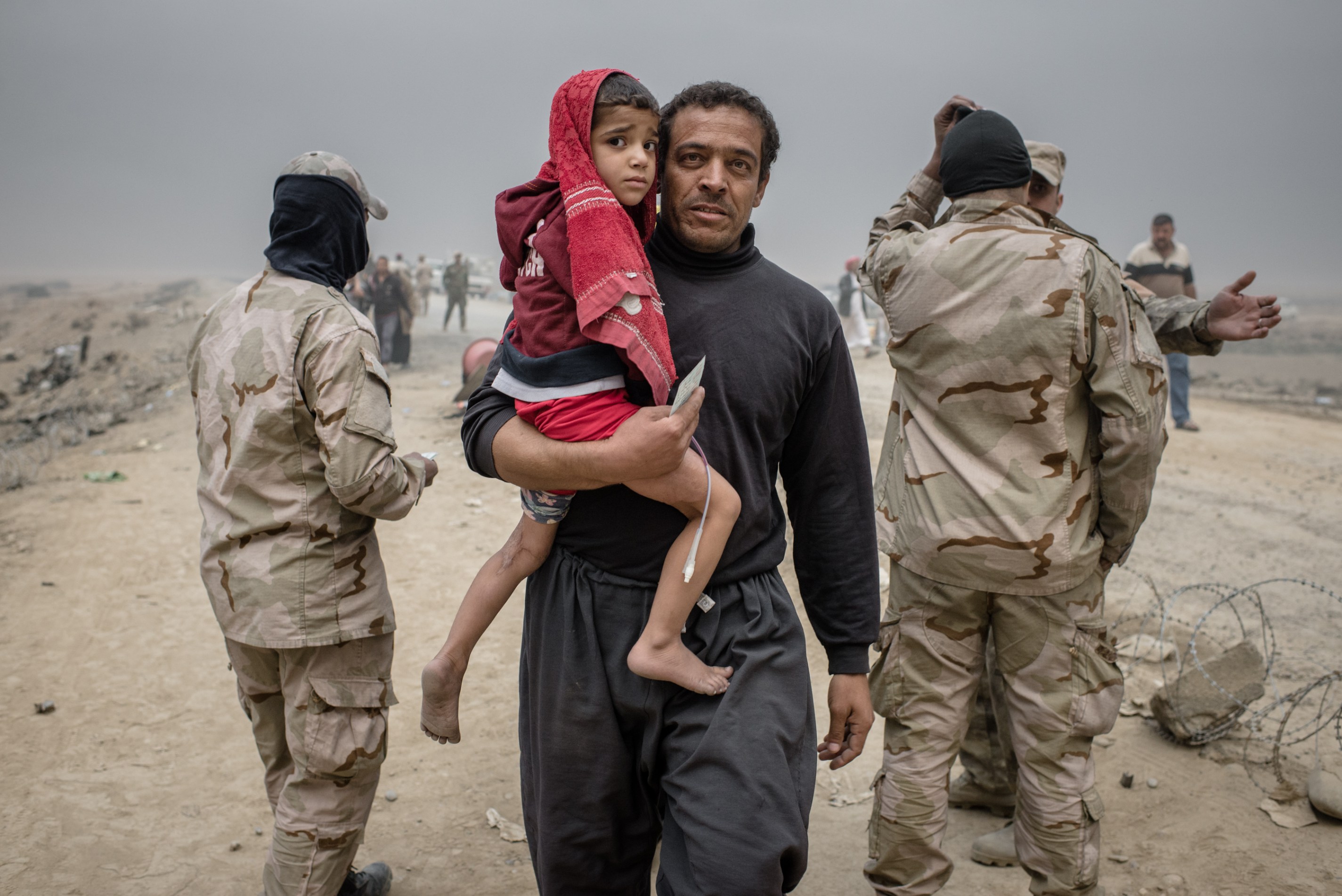
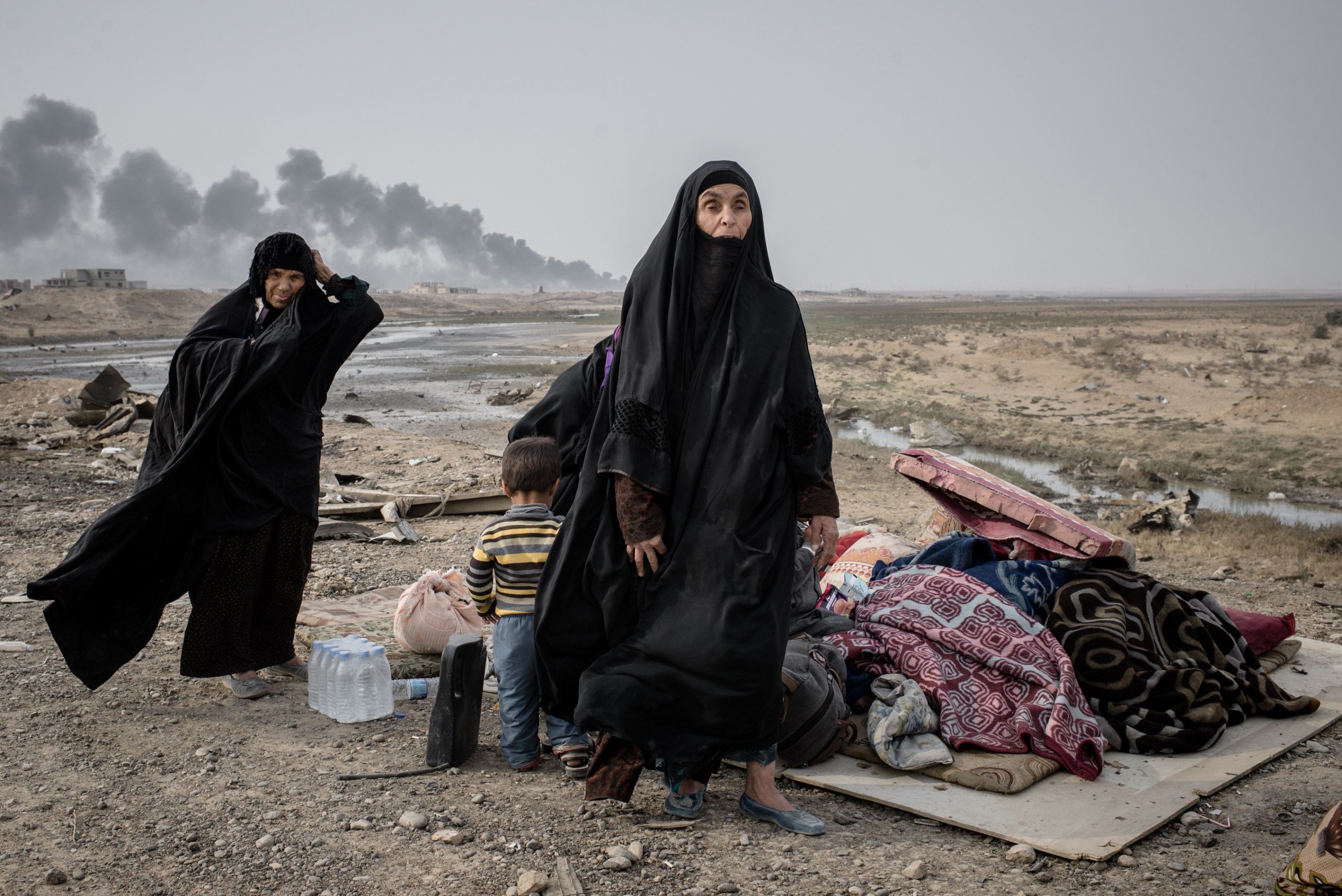
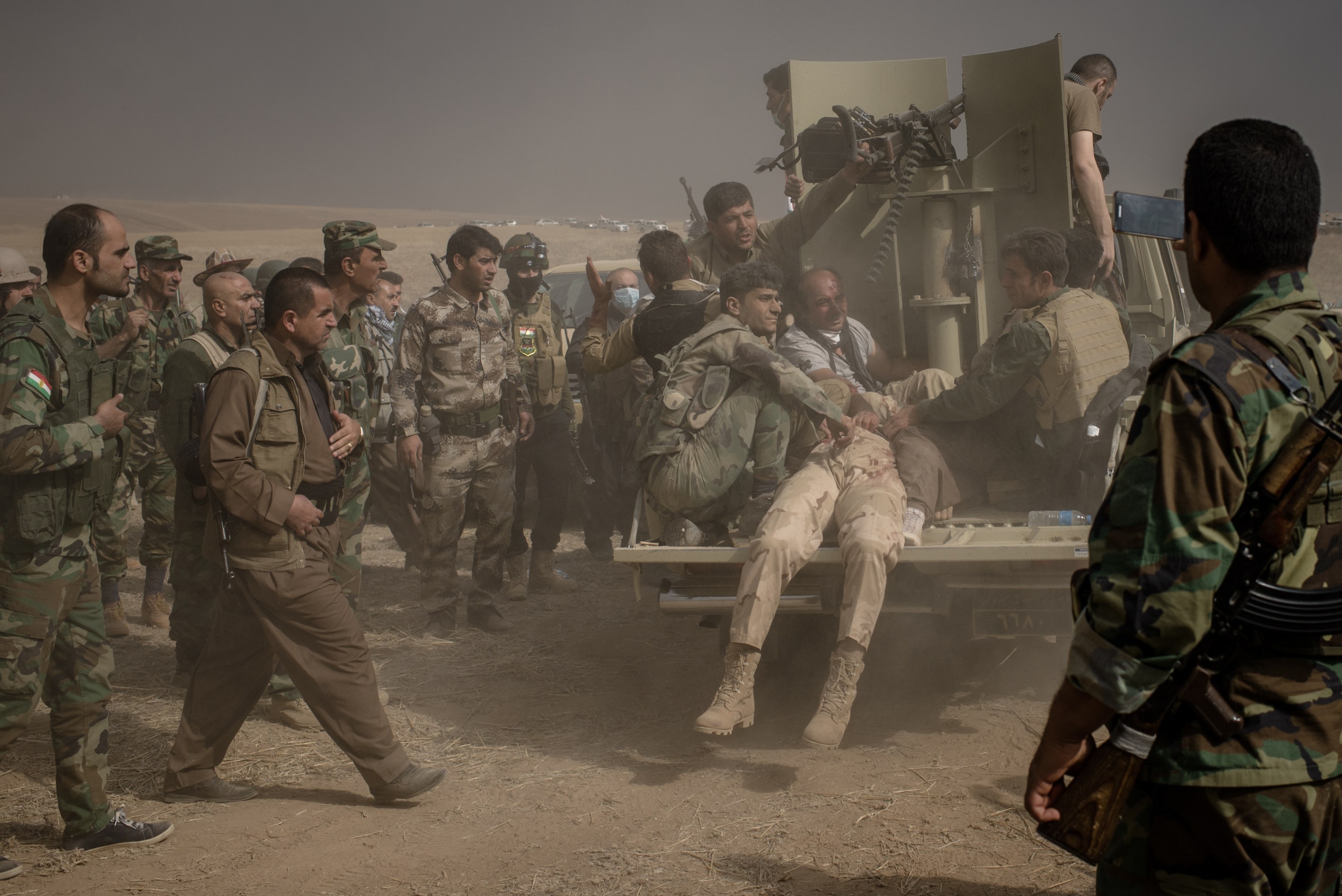
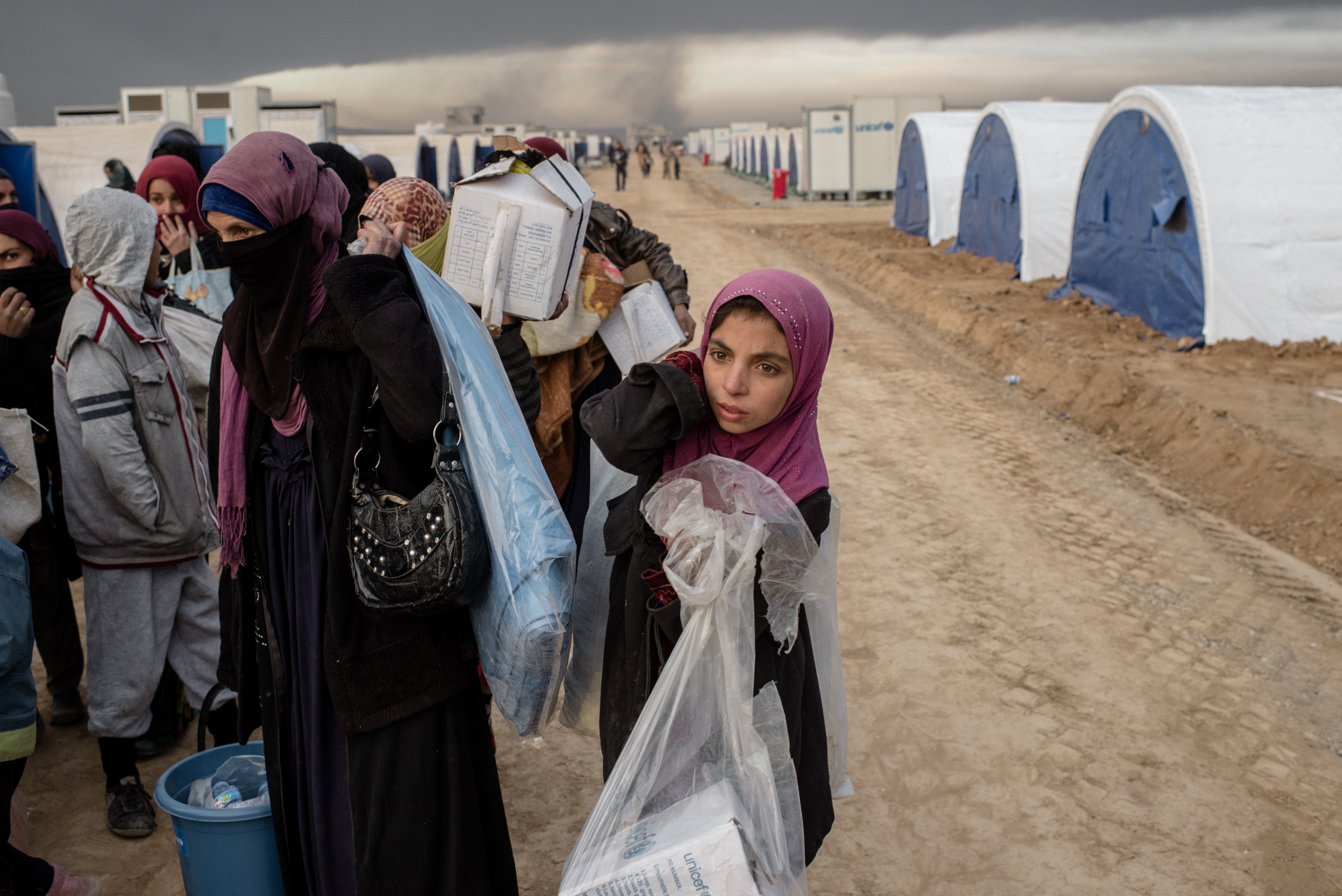
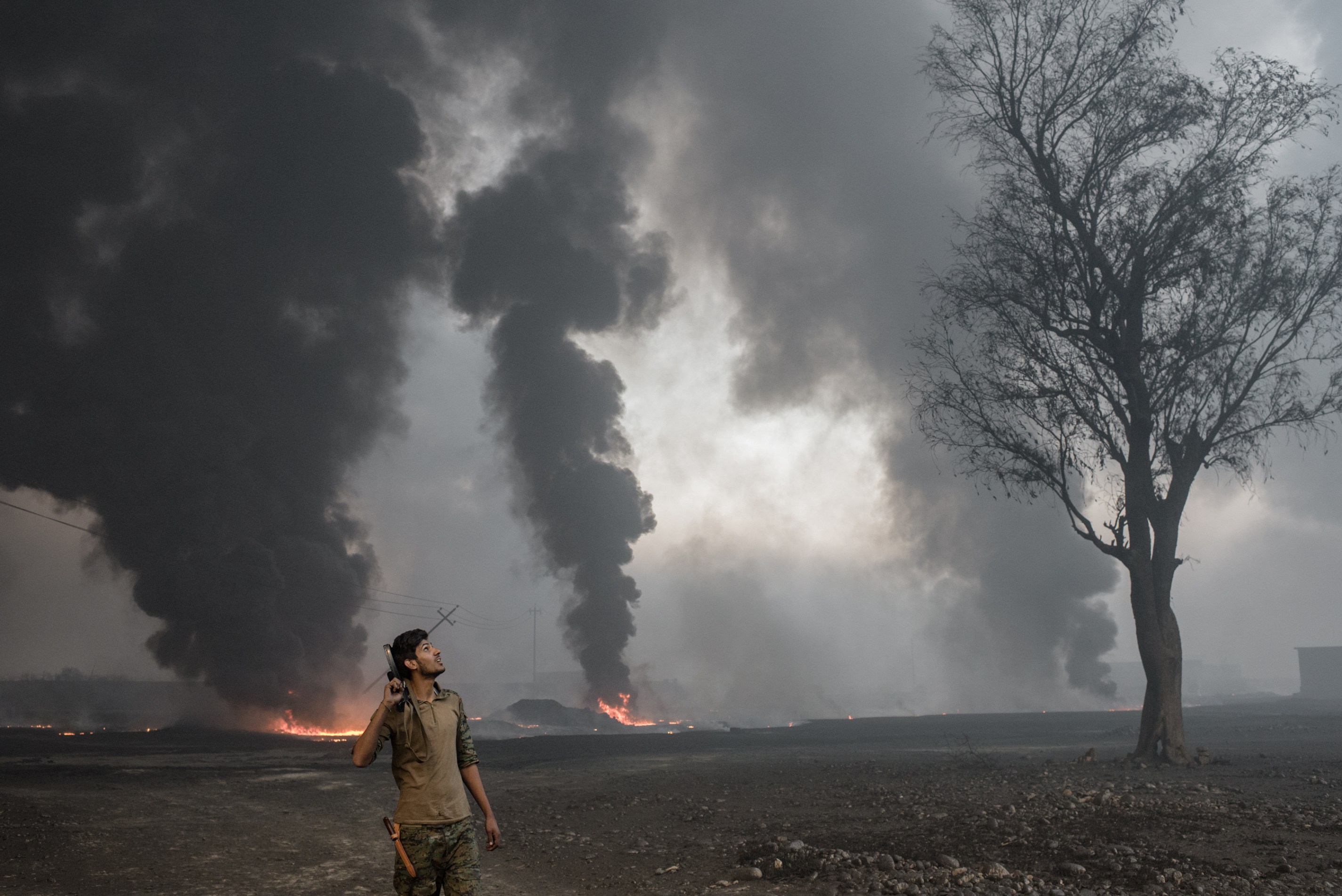
Cengiz Yar (from top):A local militia member stands in front of a blazing oil fire on the northwestern edge of Qayyarah, Iraq, Oct. 25, 2016; Displaced civilians arrive at a checkpoint on the edge of Qayyarah, Iraq, Oct. 25, 2016; A family of newly displaced civilians wait at a checkpoint on the edge of Qayyarah, Oct 28, 2016; A Peshmerga fighter, believed to be dead, is driven away from fighting with ISIS near Bashiqa, Iraq; Delah, 12, walks with her mother to a tent after arriving in the partially constructed Qayyarah Airstrip IDP camp in Qayyarah, Iraq, Dec. 8, 2016.
Romke We're doing this interview over email and some time has already passed since we started. What have you experienced in the intervening time?
Cengiz For the past month [January, 2017] I've almost entirely focused on the civilian displacement in and around Mosul. Over 125,000 people have been displaced by the fighting since late October and that number grows daily. I've been doing lots of interviews with people who recently fled the city. Horrific stories - both of life under ISIS and during this fight. Officials estimate over 1 million civilians remain in the city and as the fighting continues many are stuck in the crossfire. When people finally make it out of the fighting and into the camps, there's safety but not much else. Tents and roads flood and medical staff are under-equipped.
Romke What does the Battle for Mosul's future look like? Are you going to stay through its end?
Cengiz This month, Iraqi forces swept through and secured the last ISIS held neighborhoods on the eastern bank of the Tigris River. So they have roughly taken back about half the city and now have the western bank in their sights. They have however lost a significant amount of men and fighting capability. On top of that the west bank is the historic section of Mosul with narrow streets and old buildings. This will most likely force troops to advance by foot instead of in Humvees like they've done elsewhere - drastically changing their battle plan and increasing risk. The west bank is also said to be where ISIS has dug in most fiercely with defensive positions, booby traps, and tunnels. Iraqi forces have secured a significant amount of ground but the hardest fighting may still lie ahead.
The Battle for Mosul has since concluded, with ISIS driven out. Read about the experiences of Cengiz and his peers at Time Magazine.
Cengiz For the past month [January, 2017] I've almost entirely focused on the civilian displacement in and around Mosul. Over 125,000 people have been displaced by the fighting since late October and that number grows daily. I've been doing lots of interviews with people who recently fled the city. Horrific stories - both of life under ISIS and during this fight. Officials estimate over 1 million civilians remain in the city and as the fighting continues many are stuck in the crossfire. When people finally make it out of the fighting and into the camps, there's safety but not much else. Tents and roads flood and medical staff are under-equipped.
Romke What does the Battle for Mosul's future look like? Are you going to stay through its end?
Cengiz This month, Iraqi forces swept through and secured the last ISIS held neighborhoods on the eastern bank of the Tigris River. So they have roughly taken back about half the city and now have the western bank in their sights. They have however lost a significant amount of men and fighting capability. On top of that the west bank is the historic section of Mosul with narrow streets and old buildings. This will most likely force troops to advance by foot instead of in Humvees like they've done elsewhere - drastically changing their battle plan and increasing risk. The west bank is also said to be where ISIS has dug in most fiercely with defensive positions, booby traps, and tunnels. Iraqi forces have secured a significant amount of ground but the hardest fighting may still lie ahead.
The Battle for Mosul has since concluded, with ISIS driven out. Read about the experiences of Cengiz and his peers at Time Magazine.
Romke What can we in the West do to help those who are displaced by the conflict?
Cengiz It's incredibly important to educate ourselves and others about conflicts and those affected by them. Unless we understand what is happening, we are unable to help. Blind assistance is ineffective. Our governments are directly involved in conflicts around the world and it is our responsibility to hold them accountable and direct their actions and aid. Find out everything you can about the situation, get your facts straight, and go lobby your senator or congressman.
I'd also suggest joining a refugee resettlement community team. Welcome new people to your city and make them feel at home. Very often families move to America alone and can be a very difficult adjustment. They need friends and help getting use to life in the States.
You can also simply send your money to an aid organization (I'd suggest MSF), but again, your government probably has more money than you do to help — force them to use it correctly.
Cengiz It's incredibly important to educate ourselves and others about conflicts and those affected by them. Unless we understand what is happening, we are unable to help. Blind assistance is ineffective. Our governments are directly involved in conflicts around the world and it is our responsibility to hold them accountable and direct their actions and aid. Find out everything you can about the situation, get your facts straight, and go lobby your senator or congressman.
I'd also suggest joining a refugee resettlement community team. Welcome new people to your city and make them feel at home. Very often families move to America alone and can be a very difficult adjustment. They need friends and help getting use to life in the States.
You can also simply send your money to an aid organization (I'd suggest MSF), but again, your government probably has more money than you do to help — force them to use it correctly.
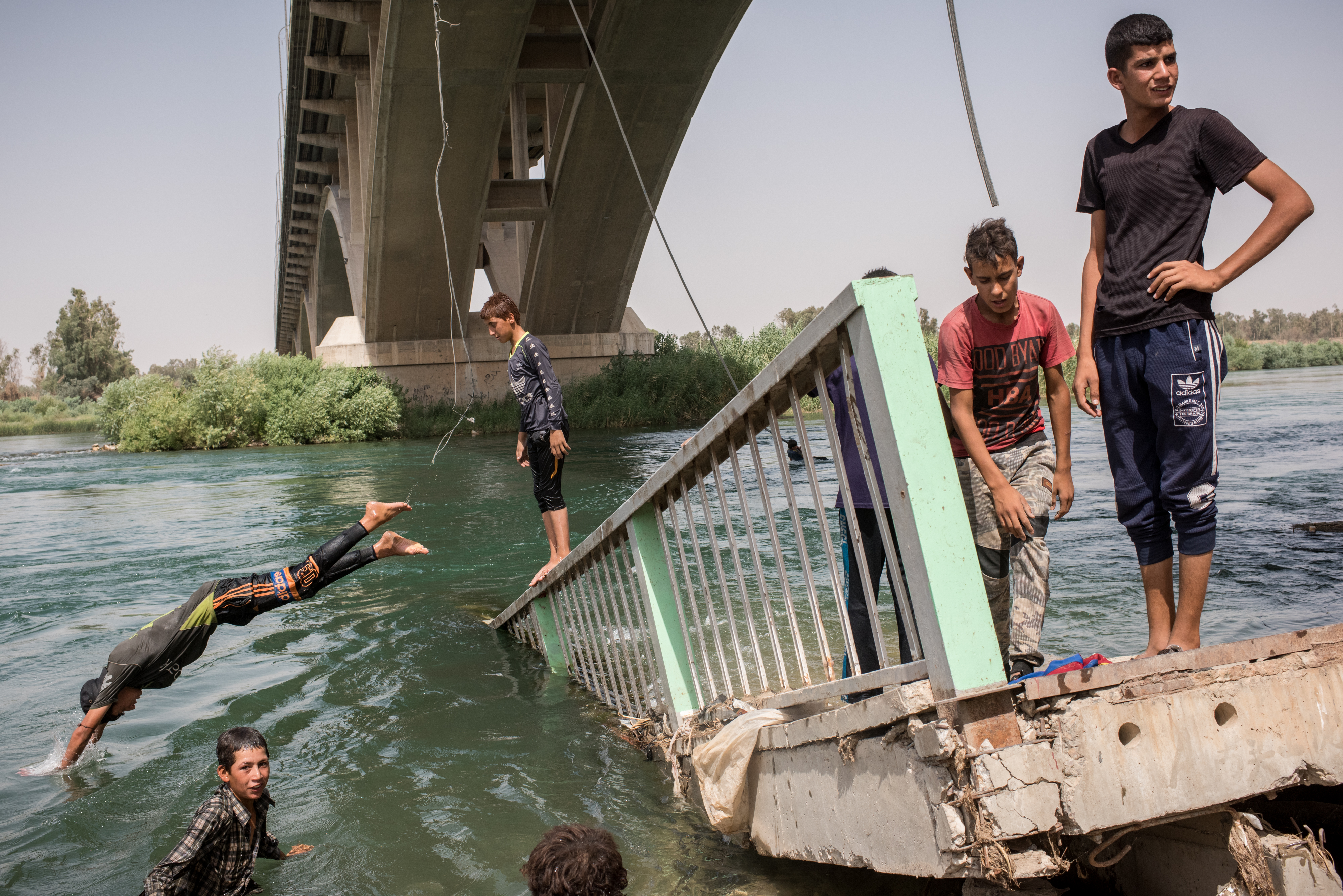
Boys swimming beneath the destroyed northern bridge connecting east and west sections of Mosul, Iraq, July 29, 2017.
Cengiz Yar, interviewed by Romke Hoogwaerts
Previously published by The Heavy Collective as a preview of The Reservoir